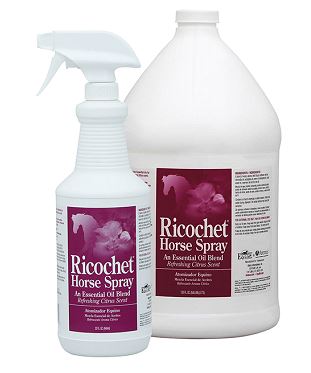
Understanding Your Horse's Natural Insect Defense
There are many ways to squash pests this fly season, such as insect repellents and fly sheets, that are useful and effective. But did you know that your horse has its own natural defense against insects?
Depending on where you live, fly season may be well under way or you may have just noticed your first buzzing of the year.
In some parts of the country, horse owners are stockig up on insect control products as a first line of defense.
Regardless of where you live, fly season prep is essential. It is also helpful to understand your horse’s natural defenses, along with ways to maximize their built-in protections.
Here are a few ways your horse is naturally equipped to handle fly season, along with our top suggestions for a fuss-free fly season.
Your Horse's Natural Pest Control Defenses
To start with, your horse has a natural protective covering – their mane and tail. These evolutionary mechanisms work to protect sensitive skin and eyes from debris and insects. Your horse's forelock takes this protection one step further, and leaving the forelock in its natural state can provide extra insect protection. Similarly, you want to keep your horse's tail free of tangles, debris and mats, as an untangled tail can more easily swat away insects.
Did you know mud or dust can be a good thing? Small doses of mud or a light covering of dust can provide a shield from pests and provide mild UV protection. Allow your horse an occasional roll in the dirt to reap the benefits. Savvy owners may even provide a "roll area," a designated spot where your horse can roll around in mud or dust. As much as it might hurt to watch your grooming efforts go to waste, the protective benefits can be worth it during fly and pest season.
Finally, horses instinctively pair up in groups to help defend against insects. You can give your horse added support by turning them out with a friendly companion, so they can help each other swish away pesky insects.
What You Can Do to Help Your Horse
While horses have natural defenses against insects and pests, there a few more things you can do to help your horse this fly season. Start by looking over your barn, paddock and pasture to evaluate whether setting fly traps in the area would be helpful.
Additionally, pasturing your horse in a non-wooded, open area has been shown to reduce exposure to flies.
Stable and house flies breed in manure, so a good manure management strategy is key in keeping fly numbers in check.
Mucking regularly and storing in a specific spot in the barn or compost area is a good habit to develop and makes for a good start to a manure management plan.
Insect guards, like fly sheets and fly masks, are another way to boost your horse's natural defense mechanisms. They help protect and repel flies naturally, without the use of harmful chemicals and are one of the most effective ways to protect the skin. Familiar with Fly Predators? These helpful, tiny insects are another natural, effective method to reduce the fly population in and around your barn. The key with Fly Predators is to release enough of them to stop each preceding generation of pest flies. Because pest flies reproduce nine times faster, it is a good idea to add new Fly Predators every three to four weeks, especially in the warm summer months. You will need enough Fly Predators to treat your farm, not just your horse. However, if used correctly, Fly Predators are an effective way to significantly reduce the fly population and provide relief during fly season.
Topical Insect Repellents
Another popular option is topical insect repellents. There is a range of topical insect repellents on the market, from synthetic based ingredients to natural, plant-based options.
 We recommend natural insect repellents that contain the following plant-based oils: citronella, citrus oil, eucalyptus oil, rosemary oil and tea tree oil. Check out our previous fly prevention blog here to learn more about these ingredients in-depth and how they work.
We recommend natural insect repellents that contain the following plant-based oils: citronella, citrus oil, eucalyptus oil, rosemary oil and tea tree oil. Check out our previous fly prevention blog here to learn more about these ingredients in-depth and how they work.
According to a 2017 study in the Journal of Integrated Pest Management, these botanical extracts and oils that work well to ward away pests. Lemongrass oil, citronella, tea tree oil, and eucalyptus oil were all shown to have repellency and toxicity to horn flies and stable flies.
This is good news for horse owners looking to stay away from conventional insecticides. These products can be toxic and endanger the health of humans and livestock. They are also known to stay in present in the environment for long period of time, including in plants and animals.
Sore No-More Ricochet Horse Spray is part of the research-backed Sore No-More line of equine topicals, and is a great plant-based coat conditioner to keep in the barn. It is designed to help soothe rashes, rain rot and more during the warm summer months.
We hope this this guide has been useful to you. With a few of these solutions, along with your horse's natural defense against insects, you can experience a much less pesky fly season this year.

